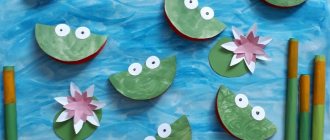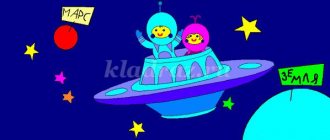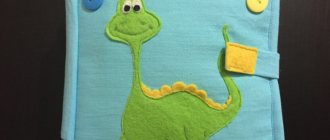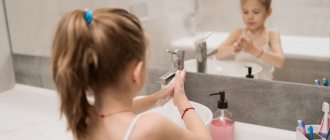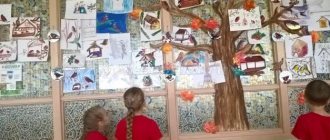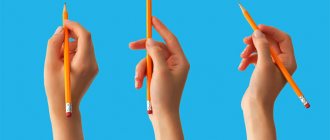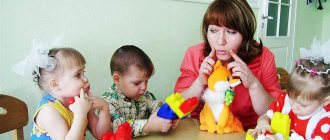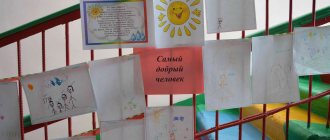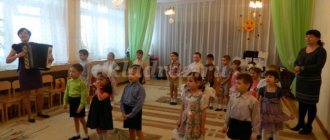Practical saving skills at home
At home, in the parental environment, you can connect the child to practical life.
For example, entrusting small purchases in a store. To begin with, it could be a simple product with a fixed price. A certain type of bread, milk, grocery line of goods. In the future, you can move on to the child’s independent choice of fruits, vegetables, meat, dairy products, and household chemicals. Only through practical means can he learn to choose the best products in terms of price and quality. And also get an idea of the conceptual scale of “expensive-cheap”. At first, try to go shopping together and in each case justify your choice of product or product.
Teach your child to understand bills for electricity, water, and understand the dependence of numbers on thrift in consumption.
Develop the habit of counting your change, even if it’s just about buying a toy, a bun, or a chocolate bar.
Good old home games will also be useful. With the little ones - to the store, pharmacy, cafe, hairdresser. For older kids, nothing better than “monopoly” has yet been invented, try it, sometimes adults get interested too.
Using clear examples, tell the children where this or that product comes from, what it is made from, and how the source material is obtained. How much effort does it take to earn money to buy it?
business, product, capital, profit, taxation, entrepreneurship
The mystery of the old coin New!
1. Museum of Money 2. How much grapes cost 3. How not to trade 4. How to sell toys 5. How to help your sister Good and glory to Russian merchants New! Stroganovs, Morozovs, Tretyakovs, Shchukins, Mamontovs, Abrikosovs, Ledentsovs, Eliseevs, Filippovs... 1. “What are you guests bargaining with?” <…> 5. Such different good About visible and invisible money and the “vegetable gardens” where they grow 1. How they changed in the old days 2. How salt and stones pretended to be money<...> 11. “Vegetable garden” for money 12. The ABC of money
A sail for the state, or About taxes in the past and present 1. Someone is asking for your money 2. Shall we abolish taxes? <…> 7. Tales of Peter the Great 8. Cheese from unpaid taxes 9. Air taxes<…>
What will this knowledge give as a result?
Involving a child in the everyday economic environment, taking into account age-related characteristics, will eliminate the barriers that previously arose for those starting to study economics as a new subject already in high school.
Some “advanced” children, already at the age of 8-9, are able to look for goods on their own and on instructions from their parents. So that they are optimal in price and quality. This is especially noticeable when searching in online stores and delivery services.
And, in any case, the children will become much more responsible and adapted to adult, independent life after graduating from school.
A story about the livestock industry according to plan for grade 2
- Animal husbandry.
- Produces meat, milk, cheeses, sausages, eggs, wool, honey.
- Provides people with food and clothing.
- The industry employs livestock breeders, veterinarians, milkmaids, shepherds, beekeepers, livestock specialists, horse breeders, poultry farmers and many others.
A story about the trade industry according to plan for 2nd grade
- Trade.
- Provides services for the sale of food, industrial and other household goods to the public.
- Provides communication between product manufacturers and buyers.
- The industry employs salespeople, cashiers, managers, loaders, stackers, sorters, and consultants.
A story about the industry according to plan for grade 2
- Industry.
- Produces various industrial goods: steel, rolled products, machinery and equipment, household appliances, cars, electronics, raw materials and much more.
- Provides industrial goods and services other sectors of the economy.
- The industry employs metallurgists, machine builders, miners, oil workers, mechanics, assemblers, welders, and power engineers.
Tatyana Popova “Magic ATM. Children about economics"
Tatyana Popova (PhD in Economics, just a moment) writes in her book about twins, Katya and Seryozha, who were transported by a magical ATM to Miracle Island. On the island, schoolchildren observe how the aborigines establish commodity-money relations, how local residents learn to develop businesses and increase their wealth.
“The book contains tasks for young readers: riddles and games of ingenuity. Children not only observe the plot from the outside, but also make interesting discoveries as participants in the events. An ATM is like a refrigerator! To take ice cream, or sausage, or juice from the refrigerator, you must first put them there. If you don’t put it down, there will be nothing to take!”
Tatyana Popova “Magic ATM. Children about economics"
GCD in economics for children of the preparatory group
NOD “Playing Economics: Family Budget”
Author: Pyzhyanova Anastasia Sergeevna social teacher of MKDOU No. 4 “Severyanochka”. “We play economics: complex classes, role-playing and didactic games”, Kireeva L.G., Teacher, 2008. Description: The material will be useful for teachers of the preparatory group. Various techniques and methods are used in the organization of educational activities: the presence of a character, conversations, didactic games, outdoor games, visual aids, multimedia presentation, musical accompaniment. To better remember new words (salary, scholarship, pension, budget, needs), it is recommended to pronounce them several times with your children. Purpose: to provide basic information about economics. Objectives: • introduce children to the concept of “needs”, “consumer basket”; • teach respect for people who work and earn their money honestly. • Reveal the gender aspect of needs; • introduce children to the concept of “budget” and the components of a family budget; • cultivate a culture of behavior, the ability to spend money economically and rationally. Didactic material and equipment: a beautifully decorated box with stars, a “consumer basket” (model of a basket with pictures of human needs: food, water, air, clothing, home, family, communication, care, household items), pictures of needs - gender aspect, presentation , multimedia installation. GCD plan: 1. Acquaintance with the country of Economy and with the Gnome - Economy. 2. Game “Box of Wishes”. 3. Conversation “Needs” - Game of “Silence”, - Game of “Sun”. 4. Didactic game “Everyone has different needs.” 5. “Family budget” puzzle. 6. Poem “Dad received a salary”, animation on the screen. 7. Conversation “How to distribute the budget.” 8. Summing up. GCD progress: Children with a teacher enter the hall. Slide "Map".
Teacher: Hello children, we are in the country of Economics. — Here we will get to know you, what your needs are, what your budget is, what it consists of, and many other interesting things. - I would like to immediately introduce you to a resident of this country, the Dwarf - the Economy. Slide "Gnome".
— Our Dwarf has a magic box, from it you can get whatever you want.
Only these desires are invisible, but they will definitely come true. The teacher brings the box to the children and the children name what they would like and take out a star from the box.
Teacher: What a person desires is called a need.
Let's repeat this word - need. The teacher takes out a basket.
Teacher: Tell me, what else do you need? What do we need for life? (Children call). — Here we have a wonderful basket - a consumer basket. Where all our needs are hidden.
— Water, food, air, clothing satisfy the physical needs of a person.
Without water, air and food, you and I cannot live. And clothes protect us from the cold. A person needs to live somewhere - in a house. And so that there are various household items in the house (toys, furniture, etc.). “And there are also spiritual needs.” Which? If the children don't answer. Teacher: I suggest you play a game of silence. Corollas, corollas The bells flew through the fresh dew, along the alien strip, they collected nuts, honey, sugar - silence! The children sit, remain silent, and gradually begin to get distracted and talk.
Teacher: Guys, is it really difficult to remain silent for a long time when there are so many friends nearby?!
This is called the need for communication. - Let's play with you some more. Game "Sunshine". Music on the slide. Children walk in a circle to calm music.
Everyone has rays of warmth (ribbons) in their hands. The teacher notices: “Look, our Andrei is frozen!”
We need to warm it up! The “frozen” person is seated in the center of the circle on a chair. Each child brings his own “ray” and says what he likes about the “frozen” one. The one who is “warmed” thanks and says “Thank you.” - Every person needs care and love. Who cares about you the most? (mom, dad) What should we call you all together: dad, mom and you? (Family). - Everyone has a need to live in a family. — Our gnome housekeeper also has a family. Let's get acquainted. Slide "Family".
Teacher: Everyone in the family has different needs.
Let's play with you. Let's split into three teams. One team chooses pictures with the needs of girls, another with the needs of boys, and the third with the general needs of both girls and boys. A didactic game “Everyone has different needs” is being played. The teacher lays out the “family budget” puzzle on the board.
Teacher: Now let's take a closer look at the family of the gnome - the housekeeper.
It has a dad who is an economist; he works in an advertising agency and receives a salary - this is money received for work. Mom, an economist, works in a bank and also receives a salary. There are grandparents. He is retired and does not work. They receive a pension - this is money received in old age for working in their youth. There is a son who is an economist, he studies at the university, and receives a scholarship - this is money for good studies. I have a housekeeper daughter, she is small and goes to kindergarten and gets nothing. All together this money is called the family budget. — Tell me, to buy food, an apartment, what do you need? (Money). - And in order to have money, what do you need to do? (Work). - Let's repeat together what mom and dad get? (salary), and grandparents - a pension, and a son who is studying? (scholarship). - How can you call all the money that the family has earned - the family budget? — Dad, the gnome-economist, received his salary, let’s look at the screen and find out how daughter Masha decided to spend it. Doc's slide. Watch the animation on the screen and listen to the poem.
Dad received a salary, Our Dad is now rich! Let's go to the store with dad and buy mom an orange. Let's buy a kilogram of sweets and sausages for lunch. Let's buy a pineapple for my brother - Dad got his salary! Let's buy grandma a banana, in general, the royal plan! Let's buy gingerbread, sausages, and cod for our pussy. Let's buy whatever we want, Together with dad today. I'm the happiest of all, guys, Dad got his salary! Teacher: Do you think Masha spent her father’s salary correctly? (No.) - How would you distribute the family budget? What should you spend on first? (Payment for an apartment, food, clothing, payment for kindergarten, toys...) Teacher: All together these are called expenses! Let's repeat this word together - expenses. I suggest you look at the screen. Slide "Expenses".
Teacher: Guys, what did we learn today? (Answers) - Today we learned that everyone has needs, we learned about the family budget and how it should be spent. What else would you like to know from the gnome-economist? Slide "Gnome". — Maybe you would be interested in finding out what money is like in other countries, or how you can learn to save so that you can spend more on entertainment and toys? — Did you like our meeting? - Then we will definitely come to visit the Gnome-Economist again. And now we say goodbye to him and go to our group.
We recommend watching:
Summary of GCD for children of the preparatory group. How to be able to count well. Notes for a lesson in economics in the senior group. Notes for a lesson in economics in the senior group. Natural and man-made world Summary of a lesson in economics in the senior group. Needs
Similar articles:
Summary of a lesson in the preparatory group of a kindergarten on the topic Vitamins
Summary of the direct educational activity “Music” in the preparatory group
Summary of a lesson in the preparatory group of a preschool educational institution on the topic: Heroes of the Russian Land
Summary of educational activities on cognitive and speech development in a speech therapy group preparatory to school
Summary of educational activities on cognitive and speech development for a speech therapy group preparatory to school
5) Think about what sectors of the economy work so that we can drink a glass of milk in the morning
So that we can drink a glass of milk in the morning:
- Animal husbandry . Cows give milk.
- Packaging industry. The milk is packaged in factory-made containers.
- Transport. Milk is delivered to retail outlets.
- Trade. Milk is on sale.
- Mechanical engineering. A refrigerator is being manufactured.
- Glass industry. A glass for milk is being made.
